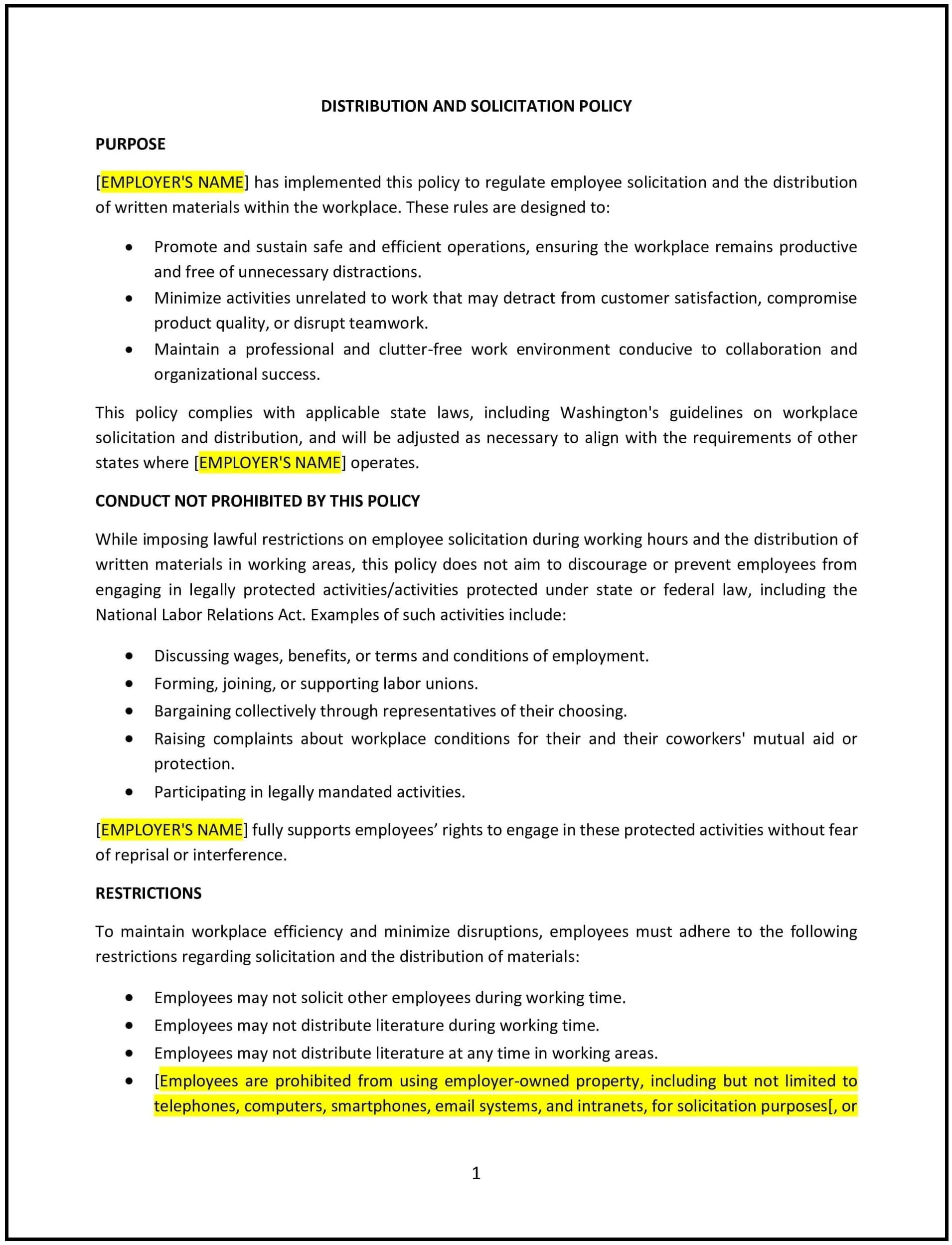Distribution and solicitation policy (Washington): Free template
Got contracts to review? While you're here for policies, let Cobrief make contract review effortless—start your free review now.

Customize this template for free
This distribution and solicitation policy is designed to help Washington businesses regulate the distribution of materials and solicitation activities within the workplace. The policy outlines what types of materials or activities are permitted, where and when distribution or solicitation can occur, and the process for employees to request permission for such activities. It ensures that any distribution or solicitation within the workplace aligns with company goals while maintaining a professional, non-disruptive environment.
By adopting this policy, businesses can ensure a fair and orderly environment for employees and prevent disruptions caused by unsolicited materials or activities, while also complying with Washington state laws related to workplace solicitation.
How to use this distribution and solicitation policy (Washington)
- Define the scope of the policy: Clearly outline what types of materials or activities are considered distribution and solicitation, such as flyers, petitions, promotional materials, and fundraising efforts. Specify whether the policy applies to all forms of solicitation or only specific types.
- Set guidelines for permission: The policy should specify that employees must seek permission before engaging in distribution or solicitation activities. Include the process for requesting approval, including who needs to grant permission and any necessary documentation.
- Identify designated areas and times: The policy should clarify where and when distribution and solicitation can occur. For example, businesses may allow solicitation in common areas during specific hours but prohibit it in workspaces or break rooms. Specify the conditions under which these activities are acceptable.
- Establish rules for acceptable materials: The policy should specify the types of materials that can be distributed, outlining any restrictions on content. It should prohibit the distribution of materials that are inappropriate, offensive, or irrelevant to the business environment.
- Address non-solicitation in workspaces: The policy should state that solicitation or distribution is not allowed in workspaces, offices, or areas where employees need to focus on their work. It should clarify that solicitation should not disrupt normal work activities or interfere with employee productivity.
- Implement guidelines for outside solicitations: The policy should specify how outside vendors or organizations can distribute materials or solicit in the workplace, if applicable. The policy may restrict or prohibit such activities without prior approval.
- Promote compliance with Washington and federal laws: The policy should promote compliance with Washington state labor laws, particularly the rules regarding solicitation in the workplace, as well as federal regulations governing workplace activities. It should ensure that employees’ rights to free speech and association are respected while balancing the need for a peaceful, productive work environment.
- Review and update regularly: Periodically review and update the policy to ensure it remains compliant with Washington state laws, federal regulations, and any changes in the company’s operations or employee needs.
Benefits of using this distribution and solicitation policy (Washington)
This policy offers several benefits for Washington businesses:
- Promotes a professional work environment: By setting clear guidelines for acceptable distribution and solicitation activities, the policy helps maintain a focused, professional workplace, free from disruptions caused by unsolicited materials or activities.
- Reduces conflicts: The policy helps prevent misunderstandings or conflicts between employees by setting clear expectations for how and when solicitation or distribution is allowed in the workplace.
- Protects company reputation: A clear, fair policy helps protect the company’s reputation by ensuring that all distribution and solicitation activities align with the company’s goals and values.
- Enhances employee satisfaction: By providing employees with a structured way to request permission for distribution or solicitation activities, the policy ensures that employees’ rights to express their views or share information are respected without interfering with workplace harmony.
- Supports legal compliance: The policy promotes compliance with Washington state labor laws and federal regulations related to solicitation in the workplace, helping businesses avoid legal risks related to employees’ rights to free expression.
- Increases clarity and transparency: The policy provides clear rules and procedures, reducing confusion and potential disputes over the appropriateness of distribution or solicitation activities.
Tips for using this distribution and solicitation policy (Washington)
- Communicate the policy clearly: Ensure all employees are aware of the distribution and solicitation policy and understand the process for requesting permission. Include the policy in the employee handbook and review it during onboarding.
- Establish a designated contact: Designate a person or team responsible for granting permission for distribution and solicitation activities. Employees should know who to contact and the process for submitting requests.
- Monitor compliance: Regularly monitor activities within the workplace to ensure that employees adhere to the policy and that no unauthorized solicitation or distribution occurs. Take appropriate action if violations are reported.
- Address disruptive behavior promptly: If solicitation or distribution activities are disruptive or violate the policy, address the situation promptly to prevent further issues. Reinforce the guidelines with employees as necessary.
- Review and update regularly: Periodically review the policy to ensure it remains compliant with Washington state laws, federal regulations, and any changes in the company’s operations. Regular updates will help keep the policy relevant and effective.